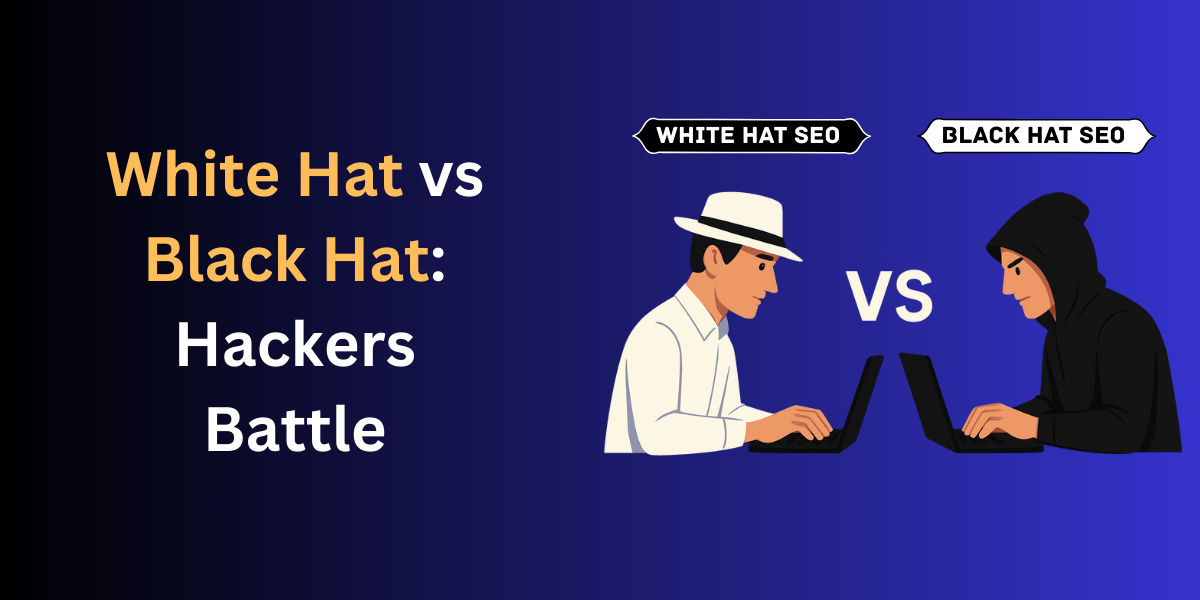White Hat vs Black Hat: Hackers Battle
In the fast-paced world of digital marketing, White Hat vs Black Hat hacking transcends mere aspects of cybersecurity and enters realms of Search Engine Optimization (SEO). The battle of White Hat vs Black Hat hackers in SEO is an eternal struggle: good and evil, ethics and deception, sustainability and shortcuts.
Modern-day businesses and marketers go on battling every day to achieve better search engine rankings, enhanced visibility, and more organic traffic. While some follow the ethical White Hat vs Black Hat practices, others turn to manipulative and aggressive methods that violate the guidelines of search engines.
Three major types of SEO in this battleground are as follows:
- White Hat SEO: Ethical and conforms to the guidelines.
- Black Hat SEO: Manipulative and perilous for quick wins.
- Grey Hat SEO and other types of hackers: Those that work in grey.
Knowing the differences in White Hat vs Black Hat SEO practices is equally relevant for marketers and companies aspiring to avoid pricey punishments, tarnished reputations, or de-indexing on search engines like Google.
In this article, we take a deeper dive into the world of SEO hackers, explain the major categories of White Hat vs Black Hat, touch upon other types of hackers in SEO, and provide some safeguards to lessen the risk and stay protected from hazardous SEO tactics.
What is white hat SEO?
White Hat SEO is the putative methods, practices, and strategies that are done in conformance with Webmaster Guidelines laid down by Google and offer real value to users.
As opposed to short-term wins often seen in White Hat vs Black Hat SEO battles, Black Hat strategies are illegal. Long-term SEO, aligned with white hat practices, is important because of its focus on quality content, good user experience, and legitimate authority on the internet.
Characteristics of White Hat SEO:
Content Quality & Relevance:
- Highly well-made, very original, unique, and user-centric content.
- The use of keywords that have been well researched and proper on-page optimization.
- Meets the criteria for answering search intent.
User Experience (UX) Optimization:
- Fast download time.
- Mobile-friendly.
- Easy navigation and accessibility from anywhere.
Ethical Link Building:
- Earn backlinks through content marketing, guest blogging, and PR.
- Focus on natural link profiles.
On-Page & Technical SEO:
- Use meta tags, titles, and headers.
- Structured data.
- Schema markup.
Compliance with the Code of Conduct:
- Abide by search engine rules.
- Stay far from spammy or manipulative tricks.
Advantages of White Hat SEO:
- Ranks are sustainable.
- Builds up trust and authority.
- Avoids penalties.
- Higher conversion rates with qualified traffic.
Challenges of White Hat SEO:
- It takes a long time to nurture the results of SEO.
- Consistent effort and patience are required.
- Continuous updating and adherence to evolving guidelines.
What is Black Hat SEO?
Black hat SEO consists of malicious, manipulative techniques of exploiting loopholes in search engine algorithms to bring faster rankings, usually at the cost of long-term sustainability.
These tactics violate Google’s guidelines and may incur harsh penalties such as demotion in search algorithms, manual action, or absolute de-indexing.
Black-Hat SEO Practices:
Keyword Stuffing
- What was once a legitimate use of metatags is now considered keyword stuffing. It refers to the practice by some people of inserting an excessive amount of repeated keywords in their copy to try to trick the search engines into awarding them more favourable rankings.
Cloaking
- The exercise of showing one piece of content material to customers and some other to search engines like google and yahoo.
Hidden Text or Links
- Concealing keywords or links to disguise them from a user.
Private Blog Networks (PBNs)
- Using a network of websites to control hyperlink juice.
Spammy Link Building
- Buying links
- Using link farms and comment spamming.
Automated Content and Spinning
- Using software to create low-quality duplicate content.
Advantages:
- Black Hat methods obtain fast results.
- High visibility in the short term.
- High returns if undetected.
Disadvantages:
- High risk of penalties imposed by Google.
- Damaging a brand’s reputation.
- Loss of building long-term ranking.
- Legal consequences are occasional.
Other SEO Hackers
Grey Hat SEO
- A gray hat lies halfway between white and black.
- The tactics may not be explicitly prohibited but would be considered manipulative in some way.
- Example: Buying old domains with existing authority, aggressive guest posting, or clickbait titles.
Script Kiddies in SEO
- There are unseasoned SEO practitioners who resort to pre-packaged SEO tools or scripts without fully understanding their repercussions.
- They tend to set up spammy, low-quality sites that violate principles.
Hacktivists in SEO
- Use the SEO craft to voice social or political agendas.
- These people might be involved with manipulating rankings of particular content to spread misinformation and propaganda.
Negative SEO Hackers
- They purposely go out of their way to hurt their competitors by building spammy backlinks to their sites, hacking their websites to inject malicious code, or stealing their content.
SEO Blackmailers
- They blackmail you into paying or favoring them in return for an undertaking of negative SEO or an exploitation of vulnerabilities.
SEO Social Engineers
- In many instances, they trick the website owners into giving them backlinks, mainly under false pretenses.
- Examples are bogus guest post requests or broken link-building scams.
Get More: Google My Business: How Local SEO Grows Your Brand
Tips to Reduce Risk & Stay Safe from Hackers
Considering threats from Black Hat attackers, negative SEOs, and such, here are practical tips to safeguard your SEO efforts:
1. Monitor Backlink Profile Regularly
- Use equipment like Ahrefs, SEMrush, or Google Search Console.
- Disavow toxic backlinks when found.
2. Maintain Website Security
- Update CMS platforms, plugins, and themes regularly.
- Use secure hosting.
- Have an SSL certificate.
- Have firewalls and anti-malware installed.
3. Avoid Suspicious SEO Offers
- Never trust an agency promising fast #1 rankings with a guarantee. Never fall for the offer of cheap mass backlinking.
4. Regularly Audit the Website
- Perform technical SEO audits.
- Look for replica content, hidden texts, or any unauthorized modifications.
5. The Security of Website Login Must Be Strengthened
- Make sure strong passwords and 2FA are used so that your site will not be hacked.
- Also, limit admin access.
6. Educate Your Team
- Train your marketing and content teams to identify SEO scams, phishing emails, and other socially engineered tactics.
7. Use DMCA and Content Monitoring Tools
- To prevent content theft.
8. Report Black Hat SEO Practices
- Use Google’s spam report tool if you come across Black Hat techniques hurting your business.
Conclusion
White Hat vs Black Hat SEO hackers are still at war in the digital world. Black Hat SEO may outwardly appear attractive because of its quick victories, but this comes at a very high price of risk and damage to brand integrity.
On the flip side, the White Hat vs Black Hat SEO debate clearly favors white hat SEO as a pathway that allows for steady growth, trust, and sustainable digital success. The option should always be for businesses to embrace ethical, user-centered SEO tactics if they want to build a reputable online footprint.
Moreover, the SEO landscape is filled with other hacker types—Grey Hat, Negative SEO, and Hacktivists—who may attempt to exploit or manipulate your site’s visibility. Understanding the differences in the White Hat vs Black Hat approaches, staying informed, implementing security measures, and aligning with experienced, ethical SEO partners can make all the difference.
At Metaloop Marketing, we advocate for white hat SEO and digital marketing ethics, ensuring our clients not only achieve impressive results but also maintain a clean, penalty-free digital footprint. Our team helps businesses avoid SEO traps, protect their assets, and grow organically using industry best practices.
Remember, in the world of SEO, patience, quality, and ethics always win the race over shortcuts and manipulative tactics.
FAQs
Q1: Is Black Hat SEO illegal?
No, Black Hat SEO is not typically illegal in a criminal sense, but it violates search engine guidelines and can result in your website being penalized or banned.
Q2: Can negative SEO ruin my website?
Yes, if left unchecked, negative SEO can severely damage your rankings, reputation, and website performance.
Q3: How lengthy does White Hat SEO take to reveal results?
White Hat search engine marketing is an extended-time period approach and can take three to 6 months or greater, relying on your opposition and enterprise.
Q4: Is Grey Hat SEO safe?
Grey Hat SEO exists in a grey area—it can work but carries risks. Search engines might also capture and penalize such processes if deemed manipulative.
Q5: How do I take a look at if my website is penalized?
Check your website’s organic traffic patterns using Google Analytics and review Google Search Console for any manual actions or notifications.



Write a Comment